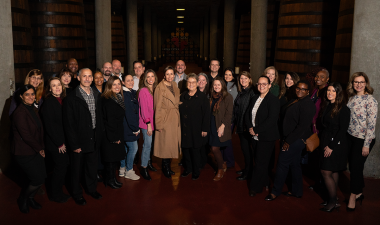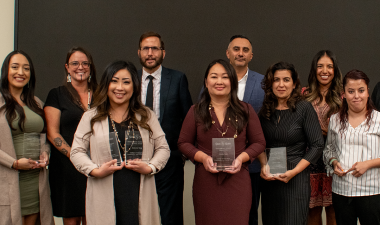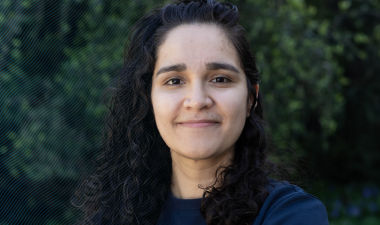Stanislaus State communication studies major James Lane never expected his three-episode podcast “Central Valley Trash Talk” to win a national award. In fact, once he completed the time-consuming project focused on illegal roadside dumping, its causes and the cleanup efforts underway, he stopped thinking about it and started enjoying the extra downtime in his schedule.
While relaxing one February afternoon, he received word of the award.
“I was at the gym on a hydro bed going through my emails when I saw one from Dr. Jacquay, the general manager at KCSS,” said Lane. “It said something like ‘Congratulations, fourth place isn’t too bad.’ I didn’t know what it meant. I had no clue the podcast had been entered in a competition.”
He quickly replied to the email and got the details: “Central Valley Trash Talk” had taken fourth place in the Best Documentary category in the 2021 National Student Production Awards by College Broadcasters, Inc.
Months earlier, the podcast aired on KCSS, Stan State’s student-run FM radio station and was entered into the competition by the station’s staff. It is now available for streaming from Soundcloud, and the engraved crystal trophy from College Broadcasters, Inc. is on display at the station.
For Lane, a former commercial truck driver whose life was turned upside down nearly a decade ago by an autoimmune disease called eosinophilic faciitis, also known as Shulman’s syndrome, the moment seemed as unlikely as it was exciting.
“The road to this award wasn’t a smooth one,” said Lane, who is on track to graduate in fall 2022. “It was actually kind of tumultuous and a bit of a struggle.”
The road to the award — Lane’s educational journey — started in 2014, when he moved to Modesto after recuperating from a prolonged bout of eosinophilic faciitis that ended his trucking career due to excruciating pain and swelling throughout his body. While he continually struggles with pain and the side effects of medication, he’s been able to control the disease well enough to enroll at Modesto Junior College and graduate with an associate degree before transferring to Stan State in fall 2019.
But shortly after he started his classes at Stan State, the disease flared up again, sidelining him physically and emotionally.
“It was just too much to bear,” Lane said. “My right arm swelled and there was a lot of pain. I couldn’t use it or write with it. I felt defeated. I didn’t know what to do, so I just stopped going to class.”
Medication and following doctors’ advice brought the disease under control. Lane was ready to return to Stan State for spring semester 2020, but there was a problem. Because he stopped attending classes without making arrangements to pause his education, he received failing grades for the fall semester and needed to go through an academic appeal process before he could return.
Feeling uncertain about the appeal process and how to navigate it, Lane found Stan State’s Disability Resource Services (DRS) office, where Director Marvin Williams helped him explain his illness and work through the appeal process so he could return to school.
“I definitely thank Marvin Williams and the DRS program for their assistance,” Lane said. “With their help, I got another chance. And if I ever have another flare up, I’ll call them right away. I won’t just stop going to class.”
By spring 2021, Lane was back in class and needed to choose a communications project, but he wasn’t sure what it would be. He found the answer while driving on Highway 99, where he and his wife noticed the growing problem of roadside trash. The problem piqued his curiosity. He decided a podcast about illegal dumping, littering and trash management would make a good project, and he went to work to make it happen.
Learning remotely due to the COVID-19 pandemic, Lane concocted a makeshift recording studio in his living room by hanging blankets around a chair and microphone. The space became his work hub as he researched trash issues, wrote scripts and recorded interviews with Modesto mayoral candidates, a biologist, a college professor and an executive of a local family-owned waste management business.
When the work was done, he had three podcast episodes that sounded so professional it surprised him.
“Who would have thought it was done in my living room on a busy street?” he said.
The first installment focuses on Highway 99, owned by the State of California, and the relationship between Caltrans and the City of Modesto to clean up illegally dumped trash. The next episode covers how trash makes its way into waterways and affects wildlife, and the third episode focuses on the history and operations of a local waste management business.
With the first podcast under his belt, Lane has been thinking about producing a follow-up podcast focused on the costs of cleaning up trash along Highway 99 and on the streets in Modesto. He said he would start by gathering information about costs from Caltrans and the City of Modesto, then examine the connection between trash and homelessness.
“It’s important to have transparency about what this is costing taxpayers, but we also need to look at whether we are just treating the symptoms by cleaning things up or are we really getting at the issues,” he said. “This problem is a health hazard. There’s trash, and there’s also human waste and syringes out there. We’ve got to do something about it.”



